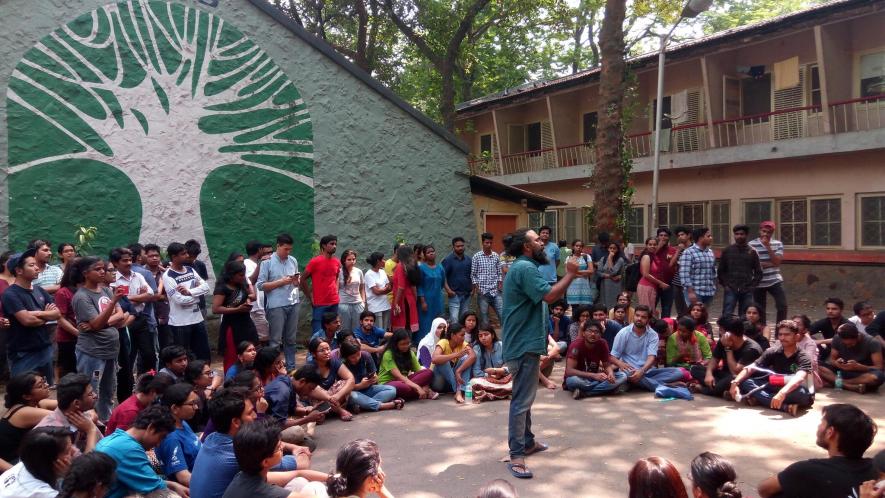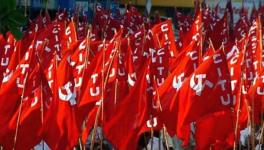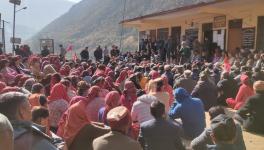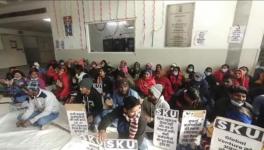TISS Students’ Strike: A Question of Protecting Diversity

Image courtesy: Progressive Students' Forum, TISS
As this article is being written, the strike called by the Tata Institute of Social Sciences (TISS) Students’ Union enters its sixth day. For the first time in the history of the Institute, a students’ strike is being observed simultaneously by four campuses in Mumbai, Hyderabad, Guwahati and the rural campus in Tuljapur, Maharashtra. The Faculty and SC-ST employees' associations at TISS, Student Unions of various universities, Left and Ambedkarite groups and student organisations adhering to different ideologies have expressed their solidarity to the students’ strike. It is important to understand what has brought about this unprecedented unity.
The main reason behind the TISS students’ strike has been a squeeze in the funds for educational aid for socially deprived students, and a disproportionate rise in the institute’s fees. Both of these are a result of the policy of privatisation and social exclusion pursued by successive regimes at the centre.
Protests started when the TISS administration informed the Scheduled Caste and Scheduled Tribe students receiving the Government of India – Post Matriculation Scholarship (GoI-PMS henceforth) to pay the entire fees upfront starting from the 2017-18 academic year. This includes students pursuing courses ranging from BA, MA, MPhil and PhD.
The GoI-PMS is a 100 per cent Centrally Sponsored Scheme allocated by the Department of Social Justice and Empowerment to students belonging to the Scheduled Caste, Scheduled Tribe and Other Backward Classes (Non-Creamy layer). Before 2015, the amount was disbursed by the respective state governments to the institutions. After the introduction of the Direct Benefit System, the scholarship was transferred to the students’ account. The ministry states that the scheme is intended to increase the number of students receiving scholarship during their post matric education and enhance their graduation rates.
However, in recent years the scheme has been losing sight of its purpose. There has been a rise in arrears, as the Ministry of Social Justice and Empowerment is yet to receive the amount from the Finance Ministry in order to facilitate the scholarship schemes. Till 2016-17, the arrears of the GoI-PMS scheme for SC students were to the tune of Rs 8000 crores. The Secretary of the Ministry of Social Justice and Empowerment deposing in front of the Parliamentary Standing Committee last year mentioned how the GoI-PMS scheme benefitted 50 lakh SC students; however, due to the huge arrears the scheme was suffering from a resource crunch and as a result it was becoming increasingly difficult to continue the flagship programme. The scheme was started as early as 1944, and has since been seen as a great leveller for SC students to attain greater mobility through easing their path to higher education. The fall in the budget allocations of the GoI-PMS for SC students in the recent budget from Rs 3347.99 crores in 2017-18 to Rs 3000 crores in 2018-19 will further increase the distress of the SC students.
Similarly, the GoI-PMS scheme for the OBC-NC students has seen huge cuts. As a result of the arrears, the state governments have been unable to transfer scholarship funds to the OBC students. Stating the non-receipt of the fellowship amount as the reason, the TISS administration in 2015 asked the OBC-NC students who were availing the GoI-PMS scholarship to pay the entire fees upfront. Earlier, all the GoI-PMS students were provided relaxation to allow them to pay their fees after receiving the amount from their respective state governments. Data gathered through RTI shows that a direct outcome of the upfront fee payment was a fall in the proportion of OBC students enrolling in the Institute – from 22 per cent in 2014-15 to 20 per cent in 2015-16 and further to 18 per cent in 2016-17.
In this context, the decision of the TISS administration to extend upfront fee payment for GoI-PMS students belonging to the SC and ST categories as well has further irked students. The institute has also witnessed massive fee hikes in the last three years. The cumulative semester fee for hostel and dining hall facilities has increased from Rs 18,000 in 2013-14 to Rs 31,000 in 2016-17, which is a rise of more than 150 per cent within a period of three years. This amount is evidently much higher than that paid by students of central universities and even other deemed universities. For instance, hostel fees (including mess bill) per semester for students in JNU and HCU are about Rs. 14,400 and Rs.12,900 respectively. It is clear that the fee at TISS has been rising at a much steeper rate than the scholarship amounts received by the SC, ST and OBC students. The increase in fees has heightened the financial pressure on all students, and is even more detrimental to the interests of students from marginalised sections.
The earlier policy of the Institute to offer relaxation of upfront fee payment to GoI-PMS students acted as a cushion to protect them from the rising cost of higher education. TISS administration’s new policy pushes the entire financial burden of stagnant or falling budgetary allocations for scholarships on to the students. This policy is a direct threat to the very survival of students from marginalised backgrounds in TISS, an institute which has always identified social justice as one of its core beliefs. The present policy is seen as undoing the positive gains achieved through affirmative action to make higher education more accessible for students from marginalised sections.
The SC-ST students who were eligible for GoI-PMS took admission for the academic years 2016-18 and 2017-19 with no information about the upfront fee payment being provided either through the prospectus or at the time of admission. However, mid-way into the course the students are being asked to pay the lump sum amount for dining hall and hostel facilities. According to UGC guidelines, all deemed universities are liable to charge the fees mentioned in the prospectus. Therefore, the demand of the students is to roll back the upfront fee payment clause for the students of the 2016-18 and 2017-19 batches. The demand is also to reverse the upfront fees policy for the GoI-PMS students belonging to the OBC- NC category.
The ongoing students’ strike in TISS is a struggle to uphold social justice and to ensure that our campuses do not become exclusive spaces of socially privileged sections. It is a struggle to be waged within the Institute as well as to build larger solidarities to make higher education affordable for all. It is a fight both against the policy of social exclusion and also against the rising threat of privatisation of higher education. The TISS struggle has to be seen in the larger context of movements for social justice in different campuses in the recent past, which ushered in a new consciousness and unity among students about making higher education in the country more diverse and equal.
Disclaimer: The views expressed here are the author's personal views, and do not necessarily represent the views of Newsclick.
Get the latest reports & analysis with people's perspective on Protests, movements & deep analytical videos, discussions of the current affairs in your Telegram app. Subscribe to NewsClick's Telegram channel & get Real-Time updates on stories, as they get published on our website.
























